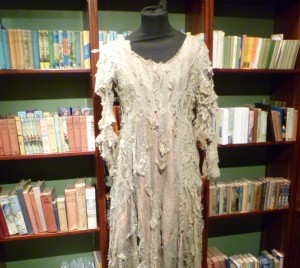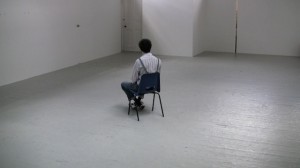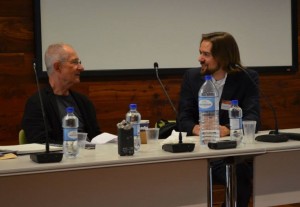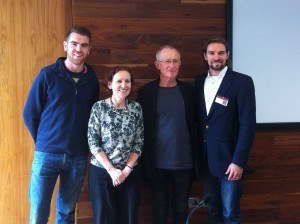Billie Whitelaw’s costume for Footfalls, RM Arts, 1988. © Sotheby’s
The University of Reading and the Beckett International Foundation are delighted to announce the purchase of a unique archive of actress Billie Whitelaw’s work with playwright Samuel Beckett.
The £35,000 acquisition, funded by generous contributions from the Beckett International Foundation, the Arts Council England/Victoria and Albert Museum Purchase Grant Fund and the Friends of the National Libraries, was made at an auction at Sotheby’s, London, last week.
Billie Whitelaw was Irish writer and Nobel Prize winner Samuel Beckett’s favourite actress. He directed her in several theatrical productions and revivals of his plays. The collection includes correspondence, annotated playscripts, rehearsal notes for some of Beckett’s most famous works, including Play, Not I, Happy Days, Rockaby, Eh Joe, Embers and Footfalls, as well costumes worn by Billie during performances of Footfalls and Rockaby.
The items will join the rest of the University’s Beckett Collection, which is the world’s largest collection of manuscript materials relating to Beckett. This will offer anyone with an interest in Beckett’s plays or the theatre – including scholars, students and theatre practitioners – a unique insight into how one of the world’s greatest writers worked with his actors.
Dr Mark Nixon, Director of the Beckett International Foundation at the University of Reading, said: ‘The University of Reading is arguably the centre of Beckett studies worldwide. This is a wonderful addition to our collection. The material complements our existing material relating to the plays they worked on together, such as Beckett’s own directorial notes as well as most of the relevant draft manuscripts and typescripts. The mind of one the most renowned playwrights, as well his crucial working relationship with actors, can now all be studied under one roof.”
Billie Whitelaw has had close links with the University of Reading since 1992 when she became the first Annenberg Fellow. During her week-long residency, she gave a series of workshops and performances for staff, students and members of the public. Over the years she has been an important supporter of the Beckett Collection and is still a Patron of the Beckett International Foundation. In 2001 she received an Honorary Degree of Doctor of Letters from the University of Reading.
Billie famously performed Not I in 14 minutes at the Royal Court in 1973. The University hosted two rare performances of this iconic Samuel Beckett work which were performed by Lisa Dwan in 2013.
Professor James Knowlson, University of Reading Emeritus Professor, friend of Beckett and his sole authorised biographer, said: “Billie Whitelaw has so many connections with the University of Reading that it is the natural place for her Beckett material to be held. We are very thrilled to have been able to purchase it.”
The Billie Whitelaw archive will feature in public events (such as exhibitions) and in undergraduate and postgraduate teaching programmes.
Guy Baxter, University Archivist, said: “This is an important investment. Theatre is such a collaborative art form so we need to document the work of the actors, designers and others who help to bring works from the script to the stage. It is wonderful to be able to gain a greater understanding of how Beckett worked with his actors, and we hope that this archive will enable researchers to do that. We would like to thank our funders for their generosity in helping us to purchase it.”















